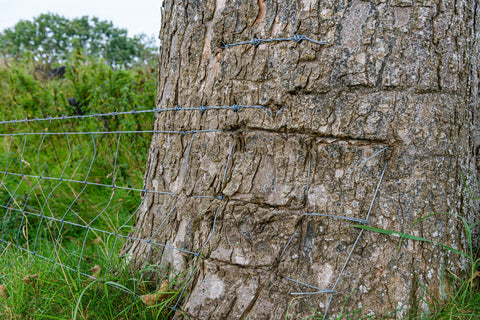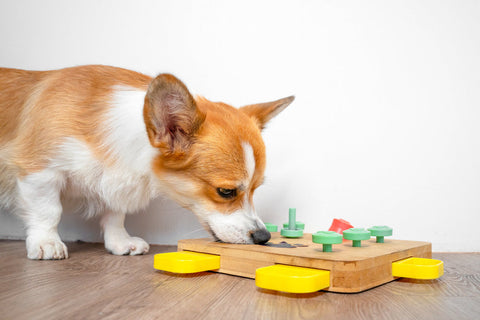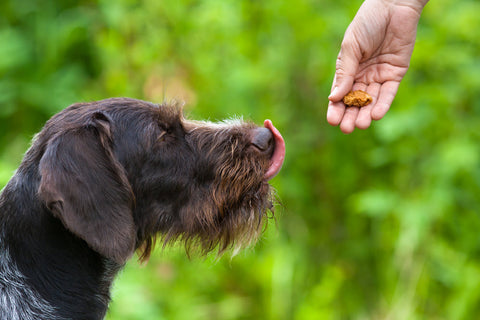Dogs dig and gardens suffer; it’s a common tale. In this comprehensive article, we’ll tackle how to stop dog digging in garden from multiple angles. You’ll learn preventative measures, training tips, and customised solutions to keep both your dog happy and your garden intact—without the fluff. Get ready to transform your trouble into a triumph.
Key Takeaways
-
Address your dog’s digging instinct by creating designated digging spots and using scent-based stimulation for breeds with strong hunting drives.
-
Implement garden-specific solutions like protective barriers or unpleasant ground covers and strategic planting to deter your dog from digging.
-
Use positive reinforcement training, ensure consistent exercise, and provide interactive toys to redirect your dog’s energy and reduce unwanted digging behaviour.
Understanding Your Dog's Digging Behaviour
Ever wondered why your canine companion is so keen on transforming your backyard into a moon-like craterous landscape? It’s all rooted in their inherent instinctual behaviour.
Let’s explore the reasoning and drive behind this persistent penchant for excavation in dogs.
Instinctive Digging
The propensity of our furry friends to dig is a trait passed down from their wolf forebears. Particularly in Terrier breeds, the urge to dog digs has its roots firmly planted in their past roles as hunting animals. There’s no cause for alarm. Your dog’s digging behaviour can be effectively controlled.
Providing specific areas where dogs are allowed to excavate and offering them plenty of mental stimulation can help protect your garden while still fulfilling your canine’s instinctual needs.
Boredom and Anxiety
Anxiety and boredom rank high among the reasons your dog might engage in digging. Just as you would seek out entertainment if left to your own devices without activities, dogs do the same.
To ensure that your dog remains engaged and happy—and to safeguard your garden from becoming a network of pits—it’s crucial to offer mental stimulation through exercise and interactive play.
Hunting and Prey Drive
Your dog may dig due to an inherent hunting instinct. Terriers and small hound breeds, which are historically bred for hunting, can be especially inclined toward such behaviour.
In order to protect your flower beds from a digging dog’s enthusiastic paws, think about employing particular scents that mimic animals using various tinctures and sprays. This can provide the stimulation your dog craves without them needing to dig destructively.
You can also hide treats around your garden to provide your digging dog with different stimuli that will divert their attention and help them stop digging.
Temperature Regulation
As temperatures rise, your dog might begin to dig in search of a cool area to rest. This is often seen in bigger dogs that have dense fur and are originally bred for chillier environments. To stop your dog from creating burrows in your yard, make sure there are ample shaded spots available for them to stay cool on warm days.
Garden-Specific Solutions

Understanding the reasons behind why dogs engage in digging behaviour, we can now focus on our gardens and consider various effective strategies to ensure they remain unscathed.
Protective Barriers
To prevent your dog from converting your garden or flower beds into a preferred digging area along the fence line, consider erecting barriers using materials such as plastic poultry fencing or large rocks.
These physical obstacles will discourage your dog from engaging in digging behaviour. Adding another level of defence by burying plastic poultry fencing just beneath the ground surface can be especially effective. Don't use Chicken Wire as this can hurt your dog's paws.
Unpleasant Ground Covers
One efficient method is to deter your dog from digging by creating an aversive environment in the soil. Distributing red cayenne pepper or powdered mustard throughout the area can bother your dog’s olfactory senses, which may prevent them from engaging in digging activities without causing them harm.
In a similar vein, embedding large stones, pebbles or applying a substantial coating of mulch could make it uncomfortable for their paws to dig into the ground, thus dissuading them from such behaviour.
Strategic Planting Choices
Finally, think about selecting plants that act as natural deterrents. Incorporate plants with pungent odours such as marigolds, which repel dogs, or opt for spiky varieties like holly that are uncomfortable for your dog to approach and dig around. Elevated flower beds or thick ground coverings can discourage the urge to dig.
Redirecting Digging Energy

It’s vital to discourage your dog from digging in the garden, but it’s just as essential to offer them an alternative way to channel their energy for digging.
Designated Digging Spots
Establishing a specific area for digging, such as a sandbox or sand-filled paddling pool, can fulfil your dog’s natural instinct to dig while preserving your garden. By concealing treats and toys in this particular spot, you enhance its attractiveness to your dog, which promotes their preference for excavating there rather than disrupting your flower beds.
Interactive Toys and Games
Toys that engage your dog, such as those dispensing treats or games where they must find hidden goodies, along with toys designed to encourage chasing, can serve as an excellent distraction for your dog’s tendency to dig. These items offer the necessary mental and physical stimulation to deter boredom-induced digging behaviour in dogs.
Physical and Mental Stimulation
To prevent your dog from digging, it’s essential to engage them with both physical activities and mental challenges. Consistent exercise routines, teaching fresh commands or tricks that are mentally engaging, and providing robust chew toys can help channel your canine companions away from the urge to dig holes.
Training Techniques for Digging Prevention

It’s essential to teach your dog not to dig as part of their overall training regime.
Now, let’s explore some methods that can assist with this.
Positive Reinforcement
Utilising positive reinforcement training is a potent method to deter your dog from engaging in unwanted digging. When you commend and provide rewards to your canine companion for choosing to engage with their toys rather than engaging in digging activities, you are strengthening good behaviours which consequently reduces the occurrence of undesirable digging behaviour.
Consistent Commands
It’s crucial to consistently use the same commands and signals when instructing your dog, no matter who is giving the instructions. By doing so, every time you, or others in your household, utter the specific command for your dog to cease digging it will become linked with halting their activity in their mind.
Professional Assistance
Should the digging behaviour of your dog be relentless or extreme, it’s important to reach out for expert assistance as soon as possible. Professional dog trainers can offer a well-organized strategy for training and continuous guidance to efficiently control your canine’s penchant for excavating, and the sooner they begin - the quicker the training will take effect.
Addressing Environmental Factors

Looking into environmental contributors to a dog’s habit of digging can be quite revealing. Let’s delve into some of these factors and discuss ways to mitigate them.
Pest Control
Controlling pests is crucial, especially when small animals such as rodents take residence in your garden. This presence might incite your dog to engage in digging behaviours as they try to chase these critters out. By managing the population of these animals, you can lessen the likelihood that your dog will feel compelled to dig.
Weather-Related Solutions
Climatic conditions can affect the tendency of your dog to engage in digging activities. Specifically, during periods of hot weather, your dog may begin to dig in an attempt to uncover a more refreshing area of cooler soil where it can recline.
Establishing a specific zone outfitted with artificial turf might prevent your dog from indulging in unwanted excavation and furnish them with a pleasant spot for relaxation.
Comfortable Outdoor Spaces
Establishing inviting areas outside can help deter your dog from digging. Providing a raised dog bed for a cosy spot to lounge and offering stimulating toys may distract your canine companion, reducing their propensity to dig as a result.
Breed-Specific Considerations
Different breeds might exhibit unique challenges regarding their digging behaviour due to their inherent tendencies. Let’s delve into how these propensities can influence your dog’s desire to dig.
Terrier Breeds
Understanding that terrier breeds are historically bred for vermin hunting, which gives them an inherent proclivity to dig, can aid in tailoring your approach to manage their digging habits.
Hound Breeds
Breeds like beagles and dachshunds, which fall under the hound category, often exhibit a propensity for digging as a result of their innate hunting instincts. Understanding this behaviour is crucial in offering them suitable alternatives to channel these impulses without causing damage to your garden.
Working Breeds
Breeds that have historically been tasked with jobs such as hunting or burrowing can exhibit a propensity to dig holes, which may be rooted in their instinctual behaviours like searching for prey or constructing dens. Recognizing the purpose behind these digging habits is crucial for effectively managing and directing them away from their inclination to dig.
Monitoring and Adjusting Strategies
It’s crucial to keep in mind that stopping your dog from digging up your garden is a continuous effort. Let's delve into how consistent monitoring, refining approaches, and acknowledging achievements can play a role in prevention.
Regular Check-Ins
By regularly monitoring your dog, you can deter the habit of unwanted digging through consistent oversight. Take these opportunities to interact with your pet and scrutinise their behaviour in order to evaluate how well your approaches are working to prevent digging tendencies.
Adjusting Strategies
It is essential to continuously evaluate the behaviour of your dog and determine the effectiveness of your strategies. Should you notice that current methods aren’t yielding results, be prepared to adapt and modify them accordingly.
Bear in mind, every dog is unique. As such, a strategy involving a dog walker that has proven successful for one might not necessarily suit another, which many dog owners can attest to.
Celebrating Success
Acknowledging and rewarding in your dog’s accomplishments is essential for reinforcing their good conduct and forming a solid relationship between owner and dog. Remember to praise even the minor triumphs, and maintain patience as improvements do not happen overnight.
Summary
To sum up, grasping the reasons behind your dog’s digging behaviour and applying appropriate measures will ensure both the preservation of your garden and your canine’s contentment. Always bear in mind that patience, consistency, and praising good behaviour are crucial elements in this process.
Frequently Asked Questions
What repels dogs from digging?
Consider employing natural repellents such as cayenne pepper, citrus peels, or vinegar to discourage dogs from digging up your garden.
Installing plastic chicken fencing just beneath the surface of the soil or implementing a motion-activated sprinkler system can serve as effective measures in preventing dogs from digging in your garden.
Do dogs grow out of digging?
It is not certain that a dog will cease digging as it matures. While some dogs may naturally stop this behaviour with age, breeds such as terriers frequently hold onto their desire for digging well into adulthood.
Why do dogs start digging in the garden?
Various factors can prompt dogs to begin digging in the garden, such as a quest for comfort and shelter against climatic elements or as a way to mitigate boredom and stress. Breeds like Terriers tend to exhibit this behaviour more frequently.
If female dogs are expecting puppies, they might dig as part of their instinctual nesting activities.
How do I fix my dog from digging in the garden?
To prevent your dog from engaging in digging behaviour, ensure that they are regularly taken for walks and actively played with. Teach them various commands or tricks to keep them engaged, and provide them with mentally stimulating toys that hold their interest. You might also want to think about enrolling in a training class together with your dog to solidify these practices.
Can certain breeds be more prone to digging?
Yes, certain breeds like terriers and hound breeds have a natural inclination to dig due to their historical breeding for hunting. Understanding your dog’s breed-specific tendencies can help you address their digging behaviour effectively.

















Share:
How to Stop Puppy Biting and Train Bite Inhibition
Dogo App Review: Revolutionising Dog Training One Bark at a Time